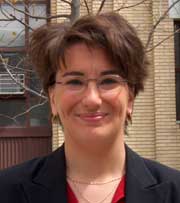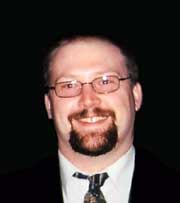| |
| |
2005
Award Winners
|  Hélène
Lebel is an Assistant Professor of Chemistry at the Université
de Montréal. She received her B.Sc. degree in biochemistry
from the Université Laval in 1993. She then started her Ph.D.
in organic chemistry at the chemistry department of the Université
de Montréal under the supervision of professor André
B. Charette as a 1967 Science and Engineering NSERC Fellow. During
her graduate studies, she worked at the development of new methodologies
for the stereoselective cyclopropanation of allylic alcohols and
she performed the total enantioselective synthesis of a natural
polycyclopropane, (+)-U-106305. In 1998, she joined the research
group of professor Eric Jacobsen at Harvard University as a NSERC
Postdoctoral Fellow where she completed the total enantioselective
synthesis of Taurospongin A. As an assistant professor, Lebel was
the recipient of a University Faculty Award (1999-04) from NSERC.
She has also received the Boehringer Ingelheim Yound Investigator
(2001), the Synthesis-Synlett-Journals Award, (2001), and the Research
Corporation Award (2001-2002) The CNC/IUPAC Travel Award will allow
her to attend the 13th IUPAC International Symposium on Organometallic
Chemistry Directed Towards Organic Synthesis in Geneva, Switzerland
in July 2005. Hélène
Lebel is an Assistant Professor of Chemistry at the Université
de Montréal. She received her B.Sc. degree in biochemistry
from the Université Laval in 1993. She then started her Ph.D.
in organic chemistry at the chemistry department of the Université
de Montréal under the supervision of professor André
B. Charette as a 1967 Science and Engineering NSERC Fellow. During
her graduate studies, she worked at the development of new methodologies
for the stereoselective cyclopropanation of allylic alcohols and
she performed the total enantioselective synthesis of a natural
polycyclopropane, (+)-U-106305. In 1998, she joined the research
group of professor Eric Jacobsen at Harvard University as a NSERC
Postdoctoral Fellow where she completed the total enantioselective
synthesis of Taurospongin A. As an assistant professor, Lebel was
the recipient of a University Faculty Award (1999-04) from NSERC.
She has also received the Boehringer Ingelheim Yound Investigator
(2001), the Synthesis-Synlett-Journals Award, (2001), and the Research
Corporation Award (2001-2002) The CNC/IUPAC Travel Award will allow
her to attend the 13th IUPAC International Symposium on Organometallic
Chemistry Directed Towards Organic Synthesis in Geneva, Switzerland
in July 2005.
|
|  Cory
Pye (b. 1971) attended Cabrini High School and Sir Wilfred Grenfell
College in Corner Brook, Newfoundland. He graduated from Memorial
University in 1992 (B. Sc. Hon., Chemistry and Applied Mathematics),
carrying out computational organic chemistry with Raymond Poirier
and Jean Burnell. While pursuing his studies of geometry optimization
for his doctorate at Memorial, he began collaborating with Wolfram
Rudolph, a Raman spectroscopist. In December 1996, he married Michelle
Bourgeois. During a two-year postdoctoral stint with Tom Ziegler
in Calgary, the COSMO solvation model was implemented in the ADF
package and applied to the study of ion pairing in olefin polymerization
catalysts. In December 1998, he became the proud father of Alexander
and Christopher, and in September 1999 accepted a position at Saint
Mary’s University in Halifax. He was recently promoted to
associate professor and currently sits on the University Senate
and Board of Governors. His research includes the theoretical study
of ion pairing in aqueous solution. Pye will use his travel award
to attend the International Conference on Solution Chemistry in
Portoroz, Slovenia in August 2005. Cory
Pye (b. 1971) attended Cabrini High School and Sir Wilfred Grenfell
College in Corner Brook, Newfoundland. He graduated from Memorial
University in 1992 (B. Sc. Hon., Chemistry and Applied Mathematics),
carrying out computational organic chemistry with Raymond Poirier
and Jean Burnell. While pursuing his studies of geometry optimization
for his doctorate at Memorial, he began collaborating with Wolfram
Rudolph, a Raman spectroscopist. In December 1996, he married Michelle
Bourgeois. During a two-year postdoctoral stint with Tom Ziegler
in Calgary, the COSMO solvation model was implemented in the ADF
package and applied to the study of ion pairing in olefin polymerization
catalysts. In December 1998, he became the proud father of Alexander
and Christopher, and in September 1999 accepted a position at Saint
Mary’s University in Halifax. He was recently promoted to
associate professor and currently sits on the University Senate
and Board of Governors. His research includes the theoretical study
of ion pairing in aqueous solution. Pye will use his travel award
to attend the International Conference on Solution Chemistry in
Portoroz, Slovenia in August 2005.
|
|  Kevin
Smith is an Assistant Professor of Chemistry at the University of
Prince Edward Island. His research is focused on the synthesis and
reactivity of paramagnetic organometallic chromium compounds of
relevance to catalytic carbon-carbon bond forming reactions. Smith
received his B.Sc. from the University of Toronto, and completed
his Ph.D. in 1998, working with Peter Legzdins at the University
of British Columbia. From 1998 to 2000, he was a Marie Curie TMR
Postdoctoral Fellow in the group of Rinaldo Poli at the Université
de Bourgogne. Smith will use his CNC-IUPAC Travel Award to attend
the 13th IUPAC Symposium on Organometallic Chemistry Directed Towards
Organic Synthesis in Geneva, Switzerland in July 2005. Kevin
Smith is an Assistant Professor of Chemistry at the University of
Prince Edward Island. His research is focused on the synthesis and
reactivity of paramagnetic organometallic chromium compounds of
relevance to catalytic carbon-carbon bond forming reactions. Smith
received his B.Sc. from the University of Toronto, and completed
his Ph.D. in 1998, working with Peter Legzdins at the University
of British Columbia. From 1998 to 2000, he was a Marie Curie TMR
Postdoctoral Fellow in the group of Rinaldo Poli at the Université
de Bourgogne. Smith will use his CNC-IUPAC Travel Award to attend
the 13th IUPAC Symposium on Organometallic Chemistry Directed Towards
Organic Synthesis in Geneva, Switzerland in July 2005.
|
|  Yan
Alexander Wang, MCIC, is an Assistant Professor of Chemistry at
the University of British Columbia. He received his Ph.D. in Chemical
Physics from Indiana University at Bloomington in 1995 under the
supervision of Ernest R. Davidson. He was a postdoctoral fellow
at the University of North Carolina at Chapel Hill with Robert G.
Parr from 1995 to 1997 and UCLA with Emily A. Carter from 1997 to
2001. Since joining UBC in August 2001, he has been actively conducting
his research in the three fronts of theoretical chemistry: fundamental
theory, method development, and state-of-the-art applications, including
functional derivative, chemical potential, embedding method, orbital-free
density functional theory, molecular simulation and modeling of
chemical reactions in biological systems and on nanomaterials. He
will use his CNC-IUPAC Travel Award to present a paper about his
research of nanotube chemistry at the IUPAC 40th Congress in Beijing,
China in August 2005. Yan
Alexander Wang, MCIC, is an Assistant Professor of Chemistry at
the University of British Columbia. He received his Ph.D. in Chemical
Physics from Indiana University at Bloomington in 1995 under the
supervision of Ernest R. Davidson. He was a postdoctoral fellow
at the University of North Carolina at Chapel Hill with Robert G.
Parr from 1995 to 1997 and UCLA with Emily A. Carter from 1997 to
2001. Since joining UBC in August 2001, he has been actively conducting
his research in the three fronts of theoretical chemistry: fundamental
theory, method development, and state-of-the-art applications, including
functional derivative, chemical potential, embedding method, orbital-free
density functional theory, molecular simulation and modeling of
chemical reactions in biological systems and on nanomaterials. He
will use his CNC-IUPAC Travel Award to present a paper about his
research of nanotube chemistry at the IUPAC 40th Congress in Beijing,
China in August 2005.
|
| |
|








